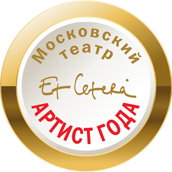Пресса
'Elder Sister' Shows Soviet Writer Volodin's Subtlety
John Freedman
«The Moscow Times» ,
02.07.2014
It's not enough for a revival, we'd need a third for that. But we had two major productions of plays by the highly respected Soviet playwright Alexander Volodin this season — Genrietta Yanovskaya's moving rendition of "Don't Part With Those You Love" at the Theater Yunogo Zritelya, and now Vladimir Skvortsov's "The Elder Sister" at the Et Cetera Theater.
Volodin is revered as one of the most subtle and accomplished playwrights of his era. Chances are the average citizen knows him primarily by his screenplays and his plays that were adapted for the screen. They made for some of the most beloved films of the 1960s and 1970s. The cream of the crop included "The Elder Sister" (1966), "Five Evenings" (1978), and "Autumn Marathon" (1979).
Volodin wrote in muted tones, he was a poet of melancholy. His characters, though outwardly functional, were deeply wounded. They were quiet outsiders, though rarely outright losers. They were the kind of individuals whose talents and special qualities would easily go unnoticed by others who were busy with daily routines. The world around them was gray and incapable of appreciating the colors that they emanated.
"The Elder Sister" could easily have been called "Two Sisters," although it is clear why the writer sought to focus our attention on Nadya, the older of two orphans. Both sisters are rich in character, ambition and experience, but Nadya, because she feels responsible for the younger Lida, bears the weight of the world on her shoulders.
Skvortsov and designer Maria Rybasova embraced the nostalgia that this play, as a popular story from the 1960s, carries with it. They opened the small, upstairs Efros Stage at the Et Cetera all the way back to the walls, filling it with items that take us back decades in time. There is a huge poster of Sergei Bondarchuk's film of "War and Peace," a tiny, old-fashioned record player, a few old hardwood movie theater seats, and a movable fold-up screen that provides much less privacy than those hiding behind it wish it did.
Nadya (Maria Skosyreva) and Lida (Yekaterina Yegorova) are old enough to live on their own, but they are looked after by their Uncle Mitya (Ivan Kosichkin). He is a well-meaning man with strong, if somewhat musty, notions of right and wrong. Caring deeply about his nieces and making more than small sacrifices for their well-being, he, in fact, is a plague upon their existence. His intolerance breaks up Lida's budding love affair with the high-strung Kirill (Andrei Kondakov), while his lack of understanding cripples Nadya's aspirations of becoming an actress before her career begins.
Reflecting the communal, or, at least, semi-communal experience that was life in the Soviet 1960s, there are many other neighbors, friends and would-be lovers constantly passing through the young women's lives. And then there is that era-defining scene, the grumpy appearance of some sour-faced Communist Party authorities who have come to investigate Nadya's moral behavior.
The first act of this long production — it runs just under three and a half hours in full — often bogs down in actors working too hard to show off their array of expressive chops — the limp, the stutter, the squeal, the arms-raised rage. At its weakest, it descends into mawkish melodrama and has a distinctive juvenile feel.
But the second act gives both young women, now a decade older, an opportunity to demonstrate their individuality, and, therefore, their independence.
Yegorova's Lida makes a fine, hard turn into adulthood as she deals with the loss of love and the growing awareness that her actions have deep consequences on the lives of many.
Skosyreva does a beautiful job of playing beneath the surface. She only rarely cuts loose with her gorgeous, sunny smile, or her affecting, soulful voice — as in a brief but moving version of "Moon River" — but one always senses that life is ready to boil over beneath her carefully controlled facade.
When this production of "The Elder Sister" lets Volodin's subtlety show through, as it often does in the second act, we see what made this fine writer's reputation.







